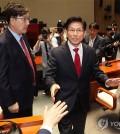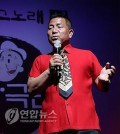- California Assembly OKs highest minimum wage in nation
- S. Korea unveils first graphic cigarette warnings
- US joins with South Korea, Japan in bid to deter North Korea
- LPGA golfer Chun In-gee finally back in action
- S. Korea won’t be top seed in final World Cup qualification round
- US men’s soccer misses 2nd straight Olympics
- US back on track in qualifying with 4-0 win over Guatemala
- High-intensity workout injuries spawn cottage industry
- CDC expands range of Zika mosquitoes into parts of Northeast
- Who knew? ‘The Walking Dead’ is helping families connect
Park renews calls for new history textbooks
SEOUL (Yonhap) — President Park Geun-hye renewed her calls Thursday for “correct” history textbooks, condemning the current ones as mostly being authored by left-wing historians.
“Some of the textbooks children are learning from these days state that they shouldn’t have been born in South Korea, and call North Korea a legitimate country,” Park was quoted as saying by chief press secretary Kim Sung-woo after she met with party leaders. “The correct way to raise our future generation is to instill in them pride in our country so they may prepare for Korean unification.”
Park said it’s regrettable that efforts to correct history textbooks have degenerated into a political issue. She also accused “80 percent of textbook authors” of having left-wing connections, Kim said.
The meeting included Kim Moo-sung, head of the ruling Saenuri Party, and Moon Jae-in, leader of the main opposition New Politics Alliance for Democracy.
The participants shared the need for correct history education, though they had different views on the government’s move to reintroduce state history textbooks for secondary school students, Kim said, without elaborating.
The opposition party has voiced its opposition to the government’s plan.
“I felt hopeless after seeing how much Park and Kim Moo-sung’s views differed from common sense,” Moon told reporters after the meeting. “Park also snubbed our request to focus on the economy and people’s livelihoods instead of standardizing history textbooks.”
The Ministry of Education said earlier this month history textbooks for middle and high school students will be authored by the government starting in the 2017 school year to address what the government calls the predominantly left-leaning contents in current books.
Currently, history textbooks are published by eight private publishing companies after being approved by an independent textbook review committee of experts. Schools choose from any of the eight textbooks, while primary schools have a single set of state-authored history textbooks.
She also asked the rival parties to quickly pass a set of bills meant to reform the labor sector as well as other bills designed to revitalize Asia’s fourth-largest economy, Kim said.
“Labor reform is the starting point for a virtuous cycle of the economy as it could create” jobs for young people, Park said.
Labor, management and the government have produced a landmark deal to ease labor restrictions. The deal would allow companies, among other things, to dismiss workers who are either negligent or underperforming.
Park also asked the political leaders to quickly ratify a series of free trade deals South Korea has inked with China, New Zealand and Vietnam to help benefit South Korean companies.
South Korea and China signed a free trade agreement in June, though the deal has yet to be ratified by the respective legislatures of Seoul and Beijing.
South Korea has clinched a series of free trade agreements with major trading partners, including the U.S., in recent years as part of its efforts to boost growth in the country’s export-driven economy.
South Korea’s exports represent around 50 percent of its gross domestic product.
Separately, Park vowed to push to stage reunions for South and North Korean families separated since the 1950-53 Korean War on a regular basis.
On Thursday, hundreds of South Koreans returned home after a three-day trip to North Korea for their first, and perhaps last, reunions with their North Korean relatives they had not seen since the Korean War.
The two Koreas are set to begin another round of temporary family reunions on Saturday at Mount Kumgang, a scenic mountain resort on the North’s east coast.
The latest family reunions are part of a recent deal that defused military tensions between the two Koreas, which are technically still at war.
The family reunions have long been affected by political situations on the Korean Peninsula. The two Koreas last held reunions in February 2014.
















Pingback: Jobs For Doctors In South Korea | Search a Doctor - Local